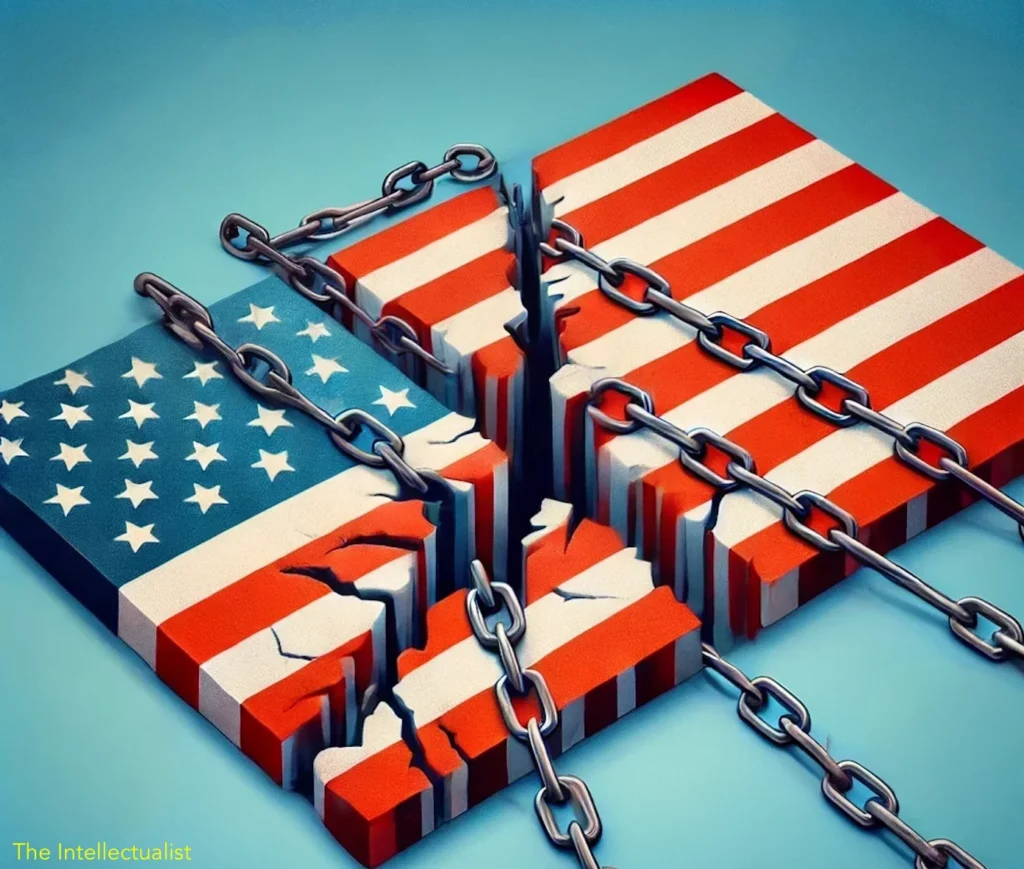The United States on the Brink: Understanding the Forces Behind Potential Disintegration

The United States stands at a precarious juncture, facing numerous challenges that threaten to unravel its social and political fabric. From the erosion of faith in government to significant economic and political disparities, these issues collectively paint a troubling picture of potential disintegration. To mitigate these risks, it is essential to understand and address the underlying dynamics.
Public trust in government erodes when it fails to represent the interests of its voters. Studies indicate that the U.S. operates more as an oligarchy than a democracy, with economic elites and business groups exerting significant influence over government policy while average citizens have minimal impact. This imbalance fosters widespread disillusionment and cynicism among the populace, undermining democratic principles and fostering a sense of disenfranchisement.
Constitutionally leveraged political structures allow less populous states to exert disproportionate influence over national policies, a dynamic known as minority tyranny. Economically productive states, often referred to as blue states, financially support less economically robust red states through federal transfers yet receive less in return. This disparity breeds resentment as blue states feel politically and economically marginalized. Over time, these states may question the value of remaining in a union that diminishes their influence and forces them to conform to ideologies that often contradict their own.
The structure of the Senate exacerbates this imbalance by granting equal representation to states regardless of population size. For example, California, with its vast economy and population, has the same Senate representation as much smaller states like South Dakota. This structural disparity undermines the principle of proportional representation, marginalizing the voices of millions of Californians and other residents of populous states. Such imbalances can lead to increasing calls for political reform to ensure fairer governance.
The political landscape could become even more volatile if Donald Trump is re-elected, especially with his threats to use troops to enforce federal policies in blue states. Such actions could exacerbate existing tensions and push blue states toward considering secession. A hypothetical West Coast nation comprising Washington, Oregon, California, and neighboring states would form an economic powerhouse. Similarly, an East Coast nation from Washington D.C. to Maine could rival the wealthiest global economies. The states left behind would face significant economic and political challenges, potentially leading to instability.
Adding to this volatile mix is the role of the Supreme Court, which has increasingly acted as a super-legislature, amassing power for itself and the presidency, particularly under Republican administrations. The decision in Trump v. United States exemplifies this, effectively creating an elected tyranny by giving a sitting president free rein to commit crimes under the guise of official acts. This ruling is particularly alarming given Trump’s history of praising authoritarian measures, such as the Tiananmen Square massacre and China’s concentration camps, and his favorable views on using federal internment camps for homeless people and conducting widespread raids. The re-election of Donald Trump would not only likely lead to civil unrest but also embolden America’s enemies. These adversaries could exploit the internal chaos to impose their will on U.S. allies and wait to strike a weakened United States, further destabilized by domestic suppression and the arrest of political rivals, as Trump has indicated he intends to do.
Additionally, the United States is grappling with historically high levels of inequality, surpassing even those of pre-revolutionary France and the Roman Empire. Inequality is a significant contributor to social instability and is correlated with higher rates of intra-community violence, especially when combined with easy access to firearms. The U.S. sees approximately 30,000 gun deaths annually, with two-thirds being suicides and one-third homicides. Inequality also drives desperation, contributing to drug abuse, alcohol abuse, and deaths of despair as people lose hope. This widespread despair further undermines faith in the system, creating a vicious cycle of disenfranchisement and instability.
The potential for an unraveling of the United States is a complex and multifaceted issue that requires urgent attention. Addressing these issues necessitates systemic reforms to restore faith in government, ensure fair representation, and prevent further division. Implementing campaign finance reforms, revising Senate representation, and enhancing civic education are critical steps towards creating a more stable and cohesive society. Additionally, fostering open dialogue and supporting grassroots movements can empower citizens and promote democratic principles.
The future of the United States depends on its ability to navigate these dangers and reaffirm its commitment to democratic principles and equitable governance.Now is the time to act decisively to secure the integrity and longevity of American democracy.

